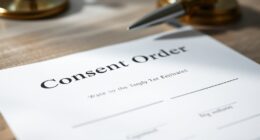After a divorce, deciding whether to buy or rent depends on your finances, stability, and plans. Buying offers long-term investment and a sense of permanence but involves higher upfront costs and market risks. Renting provides flexibility and fewer responsibilities, which can be helpful during emotional recovery. Your choice should fit your current situation and future goals. To better understand which option suits you, explore the key factors and make an informed decision.
Key Takeaways
- Renting offers lower upfront costs and greater flexibility, ideal for uncertain financial or living situations post-divorce.
- Buying provides long-term stability and equity building but requires a significant initial investment and commitment.
- Market conditions, such as rising mortgage rates and housing shortages, influence affordability and timing decisions.
- Divorce asset division can complicate property ownership, especially if market fluctuations impact home values.
- Emotional factors and future plans should guide whether stability through ownership or flexibility via renting suits your needs.

Deciding whether to buy or rent a home after divorce is a significant financial and emotional choice that can shape your future stability. On one hand, renting typically requires lower initial costs—you won’t need a hefty down payment or face closing costs, making it easier to get settled without a big financial burden upfront. On the other hand, buying involves higher upfront expenses, like a down payment and closing fees, but it also allows you to build equity over time, transforming your monthly payments into a long-term investment. If your income has been reduced due to divorce or your credit score has taken a hit, qualifying for a mortgage might be more challenging, especially with higher interest rates that can push monthly payments higher and make homeownership less affordable. Renting can provide a much-needed breathing space, giving you time to rebuild savings, improve your credit, and plan for a future purchase when the timing is better.
Renting after divorce offers lower costs and flexibility while building towards future homeownership.
When it comes to stability and flexibility, buying offers more permanence—you settle into a home that’s yours, providing a sense of security amidst emotional upheaval. But with that comes the commitment to stay put, which can be limiting if your circumstances or preferences change. Renting, however, offers flexibility, allowing you to move quickly if you find a better job, need to be closer to family, or want a different neighborhood. This mobility makes renting an attractive option during uncertain times, especially if you’re unsure about your long-term living plans or want to avoid being tied down to a property that might not suit your future needs. Additionally, renting often includes utilities and maintenance, reducing responsibilities during a transitional phase, whereas homeownership involves ongoing upkeep and potential repair costs that can add to your stress.
Financially, buying builds equity, turning your monthly payments into a valuable asset that can appreciate over time. Mortgage interest may also be tax-deductible, providing some financial relief, especially if you plan to stay in the home long-term. However, fluctuating home values pose risks—if the market declines, your investment could decrease in value. Moreover, divorce can complicate property division, and market conditions can influence the ease of dividing assets. Currently, high mortgage rates—above 7% in late 2023—significantly increase monthly payments, making buying less attractive for many. The shortage of affordable starter homes and rising rents further complicate the decision, with median rents around $1,314 per month, which might be more manageable than a mortgage in some markets. For those with existing low-rate mortgages, refinancing may not be feasible due to soaring interest rates. Furthermore, the current housing market conditions require careful planning and timing to ensure the best financial outcome.
Finally, your emotional well-being and lifestyle preferences should guide your choice. The decision impacts your sense of stability and recovery. If you plan to stay in one place long-term, buying can foster stability and build equity. If you prefer flexibility or are uncertain about your future, renting may feel safer and less restrictive. Ultimately, your financial situation, housing market conditions, and emotional readiness will help determine the best path forward after divorce.
Frequently Asked Questions
How Does Divorce Impact Mortgage Qualification?
Divorce impacts your mortgage qualification by changing your income, debt, and asset situation. Support payments like alimony and child support can boost your income if documented properly and meet lender requirements. However, higher interest rates increase monthly costs, making it harder to qualify. You might consider options like mortgage assumption or adding a co-borrower to strengthen your application, ensuring you meet credit, income, and debt-to-income ratio standards.
What Are the Tax Implications of Buying Vs Renting?
Imagine standing at a crossroads, each path whispering different promises. When you buy, you build equity and may qualify for capital gains exclusions, but face upfront costs and ongoing taxes. Renting offers flexibility, lower initial costs, and no property tax worries, yet no equity grows. Your choice affects your financial landscape—consider your cash flow, long-term goals, and tax benefits to navigate this decision wisely.
How Do Emotional Factors Influence Housing Decisions Post-Divorce?
Your emotions heavily influence your housing choices after divorce. You might cling to the family home because of sentimental value or feel the need for stability and control during turbulent times. Emotional distress can lead you to rush decisions or seek familiarity, like staying put or moving closer to support networks. Recognizing these feelings helps you make more deliberate choices, balancing emotional needs with practical considerations for your new independence.
What Legal Considerations Affect Property Ownership After Divorce?
Imagine your property rights are a game of musical chairs—except the music stops, and only one gets to sit. Legally, your ownership depends on whether the property is marital or separate, determined by contributions and agreements. Courts follow equitable distribution laws, considering factors like marriage length and contributions, to decide who keeps what. Remember, refinancing or selling might be necessary, and legal guidance is essential to avoid ending up empty-handed when the music stops.
How Can One Balance Financial Stability With Personal Healing?
To balance financial stability with personal healing, you should set clear goals for both areas. Create a realistic budget that accounts for your new expenses, and work with financial advisors to rebuild your savings. Prioritize self-care, seek emotional support, and consider therapy to process your feelings. Stay flexible, adapt your plans as needed, and remember that healing takes time—focusing on both aspects helps you move forward confidently.
Conclusion
Deciding whether to buy or rent after a divorce is tough, but remember, nearly 70% of divorced individuals find stability within their first year of renting or buying. Whether you choose to create a new home through ownership or find peace in renting, prioritize what feels right for your future. Trust your instincts and take control—your next chapter is yours to write, and making an informed choice will help you rebuild with confidence.










